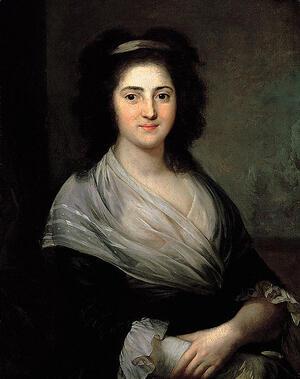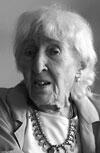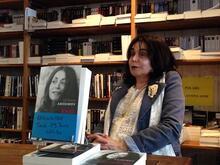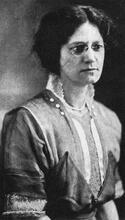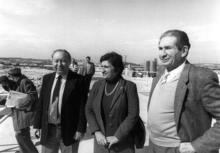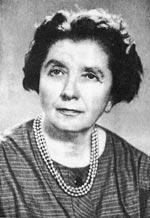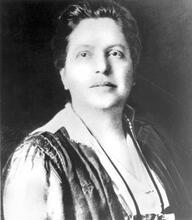Henriette Herz
A portrait of Henriette Herz in 1792 by Anton Graff. Image courtesy of Wikimedia Commons.
Henriette Herz was born in Berlin in 1764. At the age of 15, she married doctor and philosopher Marcus Herz. Henriette Herz hosted famous social gatherings that led to her be considered one of the “Salon Jewesses” of late eighteenth- and early nineteenth-century Central Europe. In her fifties, she began to write an autobiography; although she produced only a few pages, she later recounted her life story to a young man who combined the oral and written parts into a memoir, published in 1850 a few years after Herz’s death. More recently, the discovery of a collection of Herz’s letters had enabled modern readers to hear her voice and provided a uniquely immediate insight into Berlin’s active social life at the turn of the nineteenth century.
Crafting an Autobiography
Henriette Herz was already in her fifties when the opportunity arose to fulfill her life’s dream: She traveled to Italy, where she spent almost two years together with her two close friends Dorothea Schlegel and Caroline von Humboldt (1766–1829; wife of Wilhelm). There, far away from Germany, where she had converted from Judaism to Protestantism prior to her departure, she began to write an autobiography. In the early nineteenth century no other German Jewish woman tried to preserve her life in this way. Herz’s text ends after a few pages, in the middle of a word. Apparently, the genre Goethe had just perfected was too daunting. But the story was not lost. Once Henriette Herz had returned to Berlin, she recounted her life story to a certain Julius Fürst (1805–1873), a young man who then combined the written and the oral parts into a memoir, published in 1850.
In this memoir we read of Henriette Herz’s childhood. Her father, Benjamin de Lemos (1711–1789), was a Portuguese Descendants of the Jews who lived in Spain and Portugal before the explusion of 1492; primarily Jews of N. Africa, Italy, the Middle East and the Balkans.Sephardic doctor from Hamburg, her mother Esther, née Charleville (1742–1816) came from Halle. Henriette was born in Berlin in 1764. She had three siblings: Johanna Herz (née de Lemos, ca. 1786–1846), Brenna de Lemos (d. 1817), and Sara Nathan, later Sophie Natorf (née de Lemos). The memoir also tells of her marriage at the age of fifteen to the doctor and philosopher Marcus Herz (1747–1803) and of her friendships with the Humboldt brothers, Alexander (1769–1859) and Wilhelm (1767–1835), as well as with Friedrich Schleiermacher (1768–1834). We learn about the young Ludwig Börne (1786–1837), who lived with the Herz family and who, she tells us, fell madly in love with the woman of the house. We are told at great length about the fame of her social gatherings which led her to be considered one of the “Salon Jewesses.” She describes her home as one “that with no exaggeration could be reckoned among the most respected and fashionable houses in Berlin. For many years, all of Berlin’s prominent people frequented us.” The story Herz tells is of a famous beauty, fluent in many languages, learned in literature and philosophy, who reigned over a glamorous house frequented by famous people. Marcus Herz’s premature death in 1803 left Henriette with little money and put an end to this part of her story. Afterwards, she refused to remarry—though a Prussian nobleman proposed to her—and instead opened a private school for young women. Only in the last years of her life did the King of Prussia grant her a small pension.
Reconstructing a Voice Through Letters
Apart from this carefully rendered account, Henriette Herz tried not to leave any written traces behind. Like her friend Dorothea Schlegel, she had the innumerable letters she had received during her long life burned, among them those written by Dorothea Schlegel, the Humboldt brothers, and Caroline von Humboldt. The absence of any letters by her in the papers of many of her friends indicates that Henriette Herz also tried to retrieve the letters she had written in order to destroy them.
In the 1990s, however, a collection of Herz’s letters was discovered in a private Swedish archive. And now we are able to hear her voice. Almost forty letters to Karl Gustav Brinckmann (1764–1847), a diplomat at the Prussian court, survived. They span a period between 1790 and 1835; one was even written in English. In the final letter she writes: “I know what you think about the printing of private letters—I think exactly the same. What poured forth from the most profound heart to the most deeply beloved heart is put on public display to be seen by anybody!” Brinckmann did honor the confidence, not publishing Henriette Herz’s letters. But in his huge collection of manuscripts he carefully preserved them, together with some written by her husband Marcus.
These billets provide a uniquely immediate insight into Berlin’s active social life around 1800: In the summer of 1790, Brinckmann received an invitation to spend Friday evenings at the Herz’s house—“once and for ever.” Not for dinner but for tea, sometimes accompanied by buttered bread, sometimes by a bowl of soup. It was not a meal, no special event attended by guests, but was merely an opportunity for conversation. Henriette Herz requested books from Brinckmann—Sophocles for example, but also English books from the seventeenth and eighteenth centuries, most of them almost unknown today—and tickets to the opera or the theater. She invited him to parks and boat trips and introduced him to many people. Looking back to these times, Henriette Herz wrote: “The world that flattered a beautiful young woman by attributing to her all intellectual power and talents retreats from her once she becomes old and ugly.”
Collection of Letters:
Correspondence with Rahel Levin Varnhagen. In Hahn, Barbara, together with Birgit Bosold and Friederike Wein. Edition Rahel Levin Varnhagen, vol. 5. Briefwechsel mit Jugendfreundinnen. Göttingen: Wallstein, 2021, 643-651 and 983-995.
Fürst, Joseph. Henriette Herz. Ihr Leben und ihre Erinnerungen. Berlin: W. Hertz, 1850.
Hahn, Heinrich. “Henriette Herz.” In Mitteilungen aus dem Litteraturarchiv Berlin, vol. 1. Berlin: Litteraturarchiv-Gesellschaft, 1896, 141–184.
Lund, Hannah Lotte, Schneider, Ulrike, and Wels, Ulrike. Die Kommunikations-, Wissens- und Handlungsräume der Henriette Herz (1764-1847). Göttingen: V&R Unipress, 2017.
Putzel, Max. Letters to Immanuel Bekker from Henriette Herz, S. Pobeheim and Anna Horkel. Frankfurt am Main/Bern: Lang, 1972.

